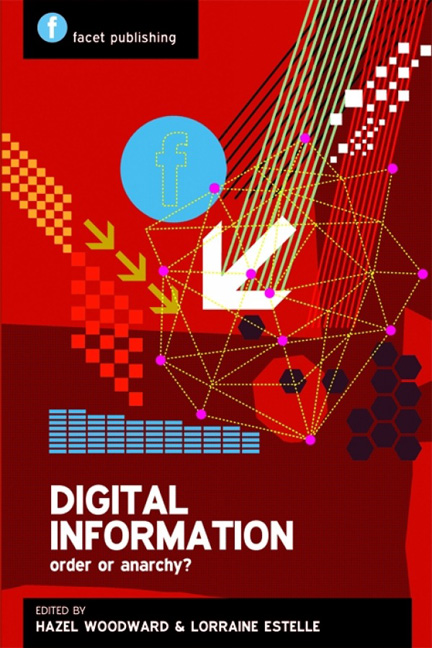Book contents
- Frontmatter
- Contents
- Acknowledgements
- Contributors
- Preface
- 1 Introduction: digital information, an overview of the landscape
- 2 Scholarly communications: the view from the library
- 3 Scholarly communications: the publisher's view
- 4 E-books and scholarly communication futures
- 5 Digitizing the past: next steps for public sector digitization
- 6 Resource discovery
- 7 Who owns the content in the digital environment?
- Index
2 - Scholarly communications: the view from the library
Published online by Cambridge University Press: 08 June 2018
- Frontmatter
- Contents
- Acknowledgements
- Contributors
- Preface
- 1 Introduction: digital information, an overview of the landscape
- 2 Scholarly communications: the view from the library
- 3 Scholarly communications: the publisher's view
- 4 E-books and scholarly communication futures
- 5 Digitizing the past: next steps for public sector digitization
- 6 Resource discovery
- 7 Who owns the content in the digital environment?
- Index
Summary
Where we are now: two crises for libraries, one crisis for Publishers
Our current situation is highly unsettled. Three primary factors combine to threaten both the ongoing viability of scholarly publishers and the traditional position of academic libraries as information brokers and intermediaries. The first two, the crisis of searching and finding, and the crisis of the collection, stem from radical changes in the information environment, fostered by the advent of digital technology in general in the 20th century, and the emergence of Google in particular. The third, the crisis of price, has been looming for decades (Panitch and Michalak, 2005), and has been discussed and debated at length for almost as long.
Libraries – the crisis of searching and finding
Google's stated reason for being is to ‘organize the world's information’. However, its actual modus operandi is much more ingenious than that. In fact, what Google's search engine does is interrogate the world's information – not all of it, but a far larger portion of it than any single library could ever hope to own, let alone index. Having interrogated the information, Google then organizes the search results by relevance. The company is notoriously (if understandably) cagey about its exact methods of relevance ranking, saying only that relevance is assessed ‘by considering over a hundred factors, including how many other pages link to the page, the positions of the search terms within the page, and the proximity of the search terms to one another’ (Blachman and Peek, 2007). Google's use of external links to assess relevance is particularly noteworthy, and while it is far from a foolproof system, it is much more effective than traditional relevance ranking, which is usually based on the prevalence of search terms. To illustrate the difference: when processing a search for the terms ‘westminster’, ‘abbey’ and ‘london’, a search engine using traditional relevance ranking will identify as many websites as possible containing those terms, and will place at the top of the result set those websites that contain the most repetitions of those three words. Google will also gather as many websites as possible, but will place at the top of the result set those sites to which many other sites have linked.
Information
- Type
- Chapter
- Information
- Digital InformationOrder or anarchy?, pp. 35 - 56Publisher: FacetPrint publication year: 2009
